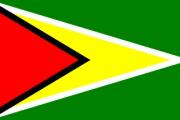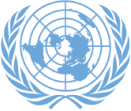Membership of the United Nations
Guyana was admitted to membership in the United Nations by resolution A/RES/2133 (XXI) of September 20, 1966, during the twenty-first regular session of the General Assembly. This was less than four months after achieving political independence on 26 May 1966. Guyana was one of four countries that joined the UN in 1966: the others were Barbados (9 December 1966), Botswana (17 October 1966) and Lesotho (17 October 1966).
In delivering our country's inaugural address to the General Assembly (September 20, 1966), then Prime Minister Forbes Burnham, stated: "My Government subscribes to the Charter of the United Nations, it has faith in this Organization, of which it hopes to be an active rather than a sleeping Member."
Since that time Guyana has maintained an active presence and visible profile in the Organisation. During the first year of membership in the United Nations, Guyana accepted an invitation to serve on the United Nations Council for Namibia. Guyana's service in the Organisation has also extended to several of its principal organs. Guyana was elected twice as a Member of the Security Council, first in 1975-76 and subsequently in 1982-83, becoming the first Caricom country to be so elected. On both occasions, Guyana served twice as President of the Council.
Guyana also served on the Economic and Social Council (ECOSOC) from 1996 to 1998. On October 17, 2005, Guyana was elected for a second tour on ECOSOC for the period 2006 to 2008.
In 1987, Guyana’s Judge Mohamed Shahabuddeen was the first Caricom national to be elected as a Judge on the International Court of Justice, where he served with distinction during the period 1988-1997. Since 1997, Judge Shahabuddeen has been thrice elected as a Permanent Judge of the International Criminal Tribunal for the Former Yugoslavia. Judge Mohamed Shahabuddeen’s latest tour on the Tribunal will extend to 2009. In August 2005, Mr. Brynmor Pollard became the second Guyanese to be elected to the Tribunal. Mr. Pollard serves as an ad litem Judge of the International Criminal Tribunal for the Former Yugoslavia.
In 1993, H. E. Mr. Samuel R. Insanally, Permanent Representative of Guyana to the United Nations, had the distinction of being the first Caricom representative to be elected to the Presidency of the General Assembly. During the period 1993-1994, Ambassador Insanally presided over the forty-eighth session of the General Assembly.
The World Hearings on Development conducted by Ambassador Insanally was a signal feature of the 48th session. The Hearings brought together high-level personalities and development practitioners to deliberate on the key requirements for the promotion of development worldwide. The report of the President of the Assembly, contained in document A/49/320, represented one of the major inputs to the development discourse at the United Nations, and is embodied in a significant way in the Agenda for Development adopted in June 1997.
The 48th session was also the occasion for the launching of the Open-ended Working Group on the Question of Equitable Representation on and Increase in the Membership of the Security Council. By resolution 48/26 of 3 December 1993, the General Assembly decided to establish an open-ended working group to consider all aspects of the question of increase in the membership of the Security Council and other matters related to the Council. The Open-ended Working Group began its deliberations in January 1994 and has continued to grapple with this difficult question ever since.
In 1999, Guyana was elected to the Chairmanship of the Group of 77. In assuming the chairmanship of the Group of 77, Guyana became the first country with a population of less than one million to preside over the affairs of the Group.
Guyana has served on various other bodies of the United Nations, including the Council on Namibia, the Commission on Sustainable Development (1996 to 2002), the Executive Board of the United Nations Children’s Fund 1986-89 and 1999-2001.
Guyana currently sits on a variety of UN bodies, among them: the Palestinian Rights Committee, the Committee on Information; the Executive Board of the United Nations Development Programme and the United Nations Population Fund for the period 2005-2007; the Commission on Population and Development (2003-2009), and the Committee on the United Nations Population Award (2004-2006).
Seven distinguished Guyanese have to date served as Permanent Representative to the United Nations: H. E. Sir John Carter, H. E. Mr. Eustace Adolphe Braithwaite, H. E. Mr. Aloysius Paterson Thompson, H. E. Mr. Frederick Hilborn Talbot, H. E. Mr. Rashleigh Esmond Jackson, H. E. Mr. Noel Sinclair, and H. E. Mr. Samuel Rudolph Insanally.
November 2005
Government of Guyana Initiatives at the United Nations
New Global Human Order
The proposal of a New Global Human Order is an initiative of the Government of Guyana aimed at mobilising concerted global action over the long-term, within a holistic framework, to address development challenges and improve the wellbeing of people. A central theme of Guyana's proposal is a concern with reversing the growing disparities between rich and poor and a focus on human development. It seeks to promote a strong political consensus and a broad-based global partnership to combat poverty and promote economic security, based on a long-term integrated approach to development. This proposal was first introduced to the United Nations General Assembly at its fifty-fifth session in the year 2000 under the agenda item, “the role of the United Nations in promoting a New Global Human Order.”
The United Nations General Assembly has considered the proposal at its 55th, 57th and 59th, 61st and 62nd sessions and has to date adopted resolutions 55/48, 57/12 and 62/213 respectively. In resolution 55/48, the Assembly took note of the proposal and requested the Secretary-General to seek the views of member states and of the agencies and organisations of the United Nations system. In response to this mandate, the Secretary-General submitted a report to the 57th session contained in document A/57/215. In addition to the views of Guyana and the Philippines, there were responses from several UN agencies.
The Secretary-General’s report concluded, among other things that, there was a need for further clarification of the boundaries and content of the proposal of a new global human order. Hence, resolution 57/12, inter alia, called for the further elaboration of the proposal, and invited proposals for consideration at the 59th Session of the General Assembly (2004). During the fifty-ninth session, the Government of Guyana submitted an updated memorandum on the New Global Human Order contained in document A/59/283. Under the terms of resolution 62/213 , the General Assembly inter alia, requests the Secretary-General to submit a report to the sixty-fifth session of the General Assembly on the implementation of the said resolution and "to include in that report an assessment of the implications of inequality for development"
In addition to its consideration by the General Assembly, the proposal of a New Global Human Order has been introduced in several intergovernmental fora, including the Non-Aligned Movement Conferences, where it has found reflection in several outcome documents of the Movement, including in the final document adopted by the Thirteenth Conference of Heads of State or Government of NAM (February 2003) and the Fourteenth Meeting of Ministers of Foreign Affairs of NAM (August 2004); the South Summit of the Group of 77 (April 2000); and most recently at the Annual Meeting of Foreign Ministers of the Organisation of the Islamic Conference (September 2003 and 2004). In addition to Guyana, the proposal of a New Global Human Order enjoys the support of the Member States of the Caribbean Community among other countries.
Guyana Permanent Mission to the UN
New York – August 2008


